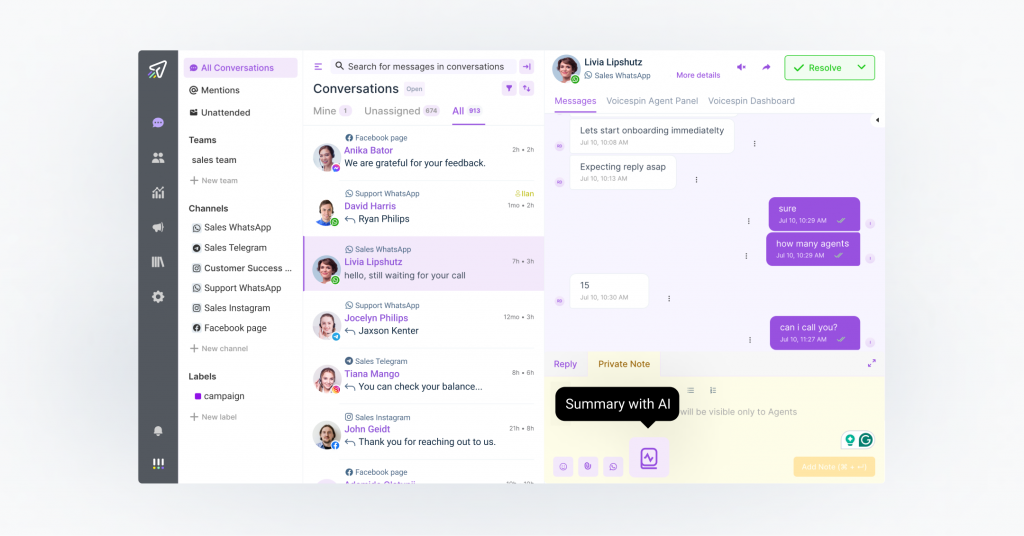Traditionally, Black Friday/ Cyber Monday (BFCM) has been the busiest shopping period of the year for businesses – and a golden opportunity to drive sales and skyrocket revenue. In 2023, Adobe Analytics reported a record $9.8 billion in Black Friday online sales, up 7.5% from 2022, while for Cyber Monday, consumers spent $12.4 billion, a 9.6% increase from the previous year.
On the flip side, the BFCM shopping season adds more pressure and stress to your customer service team. Agents get overwhelmed with support requests and repetitive questions about product availability, order statuses, shipping details, return policies, and payment issues. At the same time, they are expected to deliver quick and efficient support and maintain high CSAT scores to keep up with consumers’ demands.
So, how can you consistently meet your customers’ expectations for instant support and excellent service experience without overwhelming your support team this BFCM season? We’ve prepared the checklist that will help you get your customer support team ready for the upcoming Black Friday/ Cyber Monday without hiring new reps. Let’s get straight to it!
Black Friday/ Cyber Monday Readiness Checklist: How to Prepare Your Customer Service Team
1. Optimize your phone support to handle call volume spikes effectively
Despite the rise of digital communication channels and increasing consumer preferences for self-service support, phone remains one of the most preferred customer support channels for consumers across all age groups in many industries. It enables your customers to get answers to their questions or handle issues almost on the spot rather than having to wait for an email response that may not come until later in the day.
However, call volume spikes that typically occur during the BFCM shopping season may create longer wait times for callers, leading to reduced Customer Satisfaction Scores (CSAT). Here’s how you can manage high call volumes on Black Friday/ Cyber Monday effectively while maintaining customer satisfaction:
✓ Set your IVR and call routing rules
Setting an Interactive Voice Response (IVR) system is an excellent way to ensure your callers always reach the desired destination while also reducing the number of call transfers. The key is to keep your IVR menu options clear and concise and make it easy for callers to navigate the menu, perform self-service actions, and reach a live representative. On top of that, setting specific call routing rules (e.g., skill-based, geo-based, or time-based) can help you route calls more effectively, improve First Call Resolution (FCR) rates, reduce the Average Handle Times (AHT), and increase CSAT scores.
✓ Improve the queuing experience

While no one likes having to wait in a call queue to be connected to a live agent, you can still improve the queueing experience for inbound callers and make it a little less frustrating. Firstly, instead of simply playing hold music, make sure to inform callers about their estimated wait time or position in the queue. In addition, you can play pre-recorded messages that provide valuable information or direct callers to other support channels or your self-service options. And what’s more, you can offer callers a queue callback option.
✓ Offer in-queue callbacks
Based on a Software Advice study, 60% of consumers feel that even one minute of hold time is too much for them, while more than one-quarter indicated they’d always prefer a call back over any amount of time spent waiting on hold. The same study found that almost 50% of consumers expect their call to be returned within 30 minutes. By offering callers a queue callback option (and actually calling them back within a reasonable time), you can reduce the number of dropped calls and customer frustration associated with long wait times.
2. Expand your customer support options beyond phone and email
Today’s consumers prefer to engage with brands across multiple channels, sometimes during a single journey – and numerous studies have proven that. For example, according to Salesforce research, 71% of consumers prefer to use different communication channels depending on context. Another research by McKinsey revealed that more than half of consumers engage with three to five channels during each journey they take toward making a purchase or resolving an issue. If you aren’t yet supporting your customers on digital channels, here’s why you should consider adding the following ones:
✓ Implement human-assisted live chat
Considering that live chat has the second-highest customer satisfaction rate (85%), based on Zendesk research, implementing live chat support is a worthwhile investment in your digital customer support strategy. Consumers mostly love live chat because of the convenience it provides, allowing them to get support on the go without having to wait for an email reply or an agent to take their call while they’re on hold.
The best part about using live chat as a customer service tool is that it enables your reps to handle multiple simultaneous chats and support several customers at the same time, helping you streamline your service operations during the busy BFCM period.
✓ Integrate an AI-driven chatbot to answer simple queries
Though implementing an AI conversational chatbot takes time and effort, the long-term impact it can have on your customer service operations goes far beyond automating replies to most common questions during the busy BFCM shopping period and reducing the load on your customer service team. Chatbots can improve sales by 67%, while the conversion rate of chatbots in some industries can reach up to 70%.

Chatbots are also becoming increasingly popular among consumers, at least when it comes to resolving basic issues that don’t require a human touch. Based on chatbot usage stats from Outgrow, 74% of customers are willing to choose a chatbot over a human agent to look for answers to simple questions. And what’s more, 40% of shoppers don’t care if they talk to a human or an AI chatbot as long as they get quick answers to their questions, according to HubSpot.
✓ Start supporting your customers on WhatsApp
With almost 3 billion users worldwide, WhatsApp is clearly one of the most popular instant messaging apps now in over 100 countries. And with 65% of consumers preferring to interact with brands through messenger apps (according to Salesforce) – WhatsApp is increasingly being used by businesses for customer support and proactive engagement.
The benefits of using it as a customer service channel are obvious. Just like live chat, WhatsApp is convenient for consumers, and they are already familiar with its interface. Users can easily share images and voice messages, giving your reps more context and enabling them to solve issues faster and more efficiently.
Recommended reading: How to Choose the Right Customer Service Channels for Your Business
3. Create a killer FAQ page to reduce the number of incoming requests
Based on a report from Higher Logic, 84% of consumers try to solve support issues on their own before they reach out to customer support, and 79% expect organizations to provide self-service support tools. Considering that your support team is most likely to get a large number of repetitive questions during the BFCM period, having a comprehensive FAQ section and enabling your customers to easily find information on their own is a great way to reduce the number of support tickets and calls and save time for both your customers and support reps.
More importantly, when your customers can easily access information about your shipping policies and returns before making a purchase, that can also help you prevent complaints. For instance, if you’re an e-commerce business, you may want to check out the FAQ page from Zappos. It answers nearly every possible question their customers may have – and all questions are logically organized into categories, making it easy for users to find what they’re looking for.

4. Get your predefined responses and scripts ready
Whatever customer service software your team is using, most solutions allow you to create predefined responses, also known as canned responses, templates, macros, or scripts. They can help your support reps answer common questions in a standardized way while also improving the speed of support, reducing handle times, and improving customer satisfaction. Besides, canned responses help maintain brand consistency in messaging across the team and ensure your reps always share accurate information.
For example, when interacting with customers across digital channels, predefined responses enable agents to answer common questions with just a click of a mouse rather than having to craft responses each time from scratch. Alternatively, when engaging in voice interactions, with ready-made inbound call scripts at hand, agents can respond quickly, confidently, and effectively in every possible scenario.
Recommended reading: Inbound Call Center Scripts for Customer Service Teams
5. Make sure your reps are fairly rewarded for overtime
Customer service jobs are known to be stressful by nature. Agents often have to deal with complaints, difficult customers, and repetitive tasks, not to mention the pressure of having to meet performance targets. If you’re planning to handle an increased number of support requests during the holiday season without hiring additional reps, that ultimately means your agents will have to work overtime, adding more stress to their daily workflow.
So, how can you make it a little less stressful for your team? The answer is simple: by offering additional rewards and incentives beyond the standard overtime pay. Make sure, though, the rewards and incentives are meaningful to your reps and reflect their actual preferences and expectations. In fact, research from Blackhawk Network revealed that in many cases, incentives employees would like to get from employers are not aligned with their employer’s offerings.
Recommended reading: Call Center Employee Incentives to Keep Your Team Motivated
Next Steps in Your BFCM Preparation and How VoiceSpin Can Help
During busy shopping periods like BFCM and other holiday sales, the customer service software you use can make a big difference for your team. With thoughtful planning and the right Black Friday/ Cyber Monday business preparation tools at hand, you can easily handle an increased number of support requests and maintain customer satisfaction without burdening your service agents.

VoiceSpin’s call center software and omnichannel support solution can help you improve CX and boost holiday sales this BFCM season with these features and capabilities:
- Flexible and easily scalable infrastructure: The ability to scale operations quickly is critical during BFCM when inbound call volume surges. While some call center systems are hard to scale, VoiceSpin’s flexible, entirely cloud-based infrastructure ensures you can add new agents and scale operations almost instantly with no interruptions to your service.
- IVR and custom call routing: Set multi-level IVRs and custom call routing rules and route calls based on time of day, callers’ geographic location, or skills. Ensure your customers or prospects always reach the right department or specific agents who are best suited to handle their requests, helping you maintain high FCR rates and CSAT scores.
- Call queue management: Handle large volumes of incoming calls in an efficient and organized way while also improving the experience for callers waiting in queue with pre-recorded prompts. Offer customers a queue callback option so they don’t have to wait on hold and reduce dropped calls.
- Integrations with CRM systems: Empower your customer support reps with instant access to customer data, preferences, and history of previous purchases and interactions to deliver more personalized experiences by integrating your call center software with your CRM system through pre-built or custom CRM integration options.
- Omnichannel readiness: Efficiently handle your Black Friday/ Cyber Monday traffic with an omnichannel contact center platform. VoiceSpin’s AI Messaging allows you to integrate email, live chat, social media, WhatsApp, and other digital channels, enabling your team to manage customer interactions across all touchpoints from a single omnichannel inbox.
- AI-driven chatbots: Your team is bound to get lots of repetitive queries during the BFCM sales season. Integrate an AI chatbot and train it on your own data to automatically answer your most common questions and free up your reps to focus on higher-value tasks like resolving complex requests, handling escalated cases, or upselling.
Book a demo call today to see VoiceSpin’s AI-first contact center solutions in action and learn more about how they can benefit your customer service team, help you improve CX, and drive your business growth.





 +18889082995
+18889082995
 +442036084160
+442036084160
 +97237237006
+97237237006